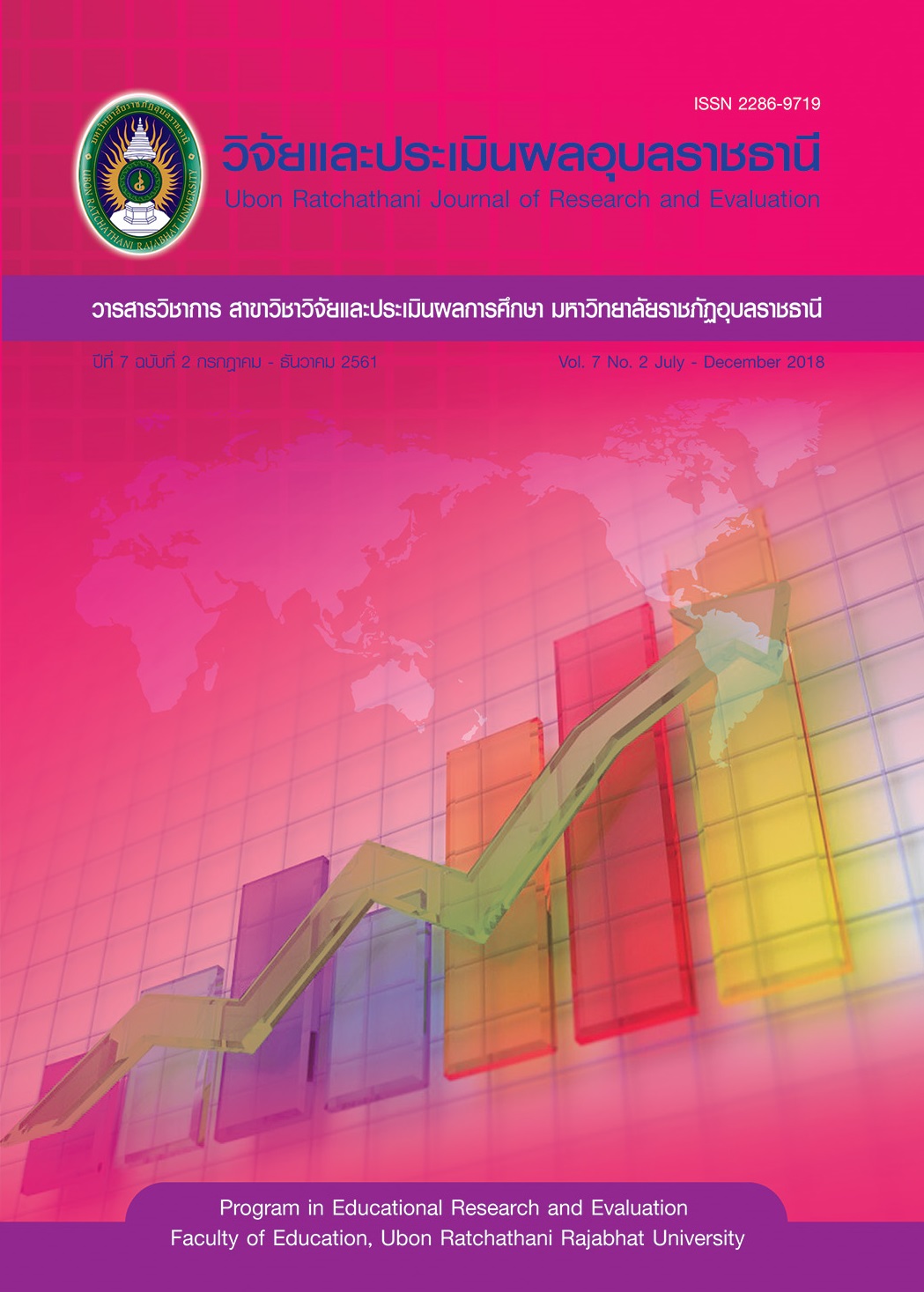การพัฒนาความสามารถในการเรียนรู้เชิงรุกในศตวรรษที่ 21 สำหรับนักเรียนชั้นมัธยมศึกษาตอนต้น
คำสำคัญ:
ความสามารถในการเรียนรู้เชิงรุก, ศตวรรษที่ 21, นักเรียนมัธยมศึกษาตอนต้นบทคัดย่อ
การวิจัยครั้งนี้มีวัตถุประสงค์ 1) เพื่อศึกษาความสามารถในการเรียนรู้เชิงรุก 2) เพื่อพัฒนารูปแบบการเรียนรู้ที่ส่งเสริมความสามารถในการเรียนรู้เชิงรุก 3) เพื่อทดลองใช้รูปแบบการเรียนรู้ที่ส่งเสริมความสามารถการเรียนรู้เชิงรุก และ 4) เพื่อประเมินรูปแบบการเรียนรู้ที่ส่งเสริมความสามารถในการเรียนรู้เชิงรุก ตัวอย่างเป็นนักเรียนชั้นมัธยมศึกษาปีที่ 3 โรงเรียนสตรีสิริเกศ อำเภอเมือง จังหวัดศรีสะเกษ จำนวน 70 คน ได้มาจากวิธีการสุ่มตัวอย่างแบบกลุ่ม เป็นกลุ่มทดลอง จำนวน 35 คน เรียนด้วยรูปแบบการเรียนรู้ที่พัฒนาขึ้น และกลุ่มควบคุม จำนวน 35 คน ที่เรียนด้วยรูปแบบปกติ เครื่องมือที่ใช้ในการวิจัย ได้แก่ 1) แบบวัดความสามารถในการเรียนรู้เชิงรุก 2) แบบวัดผลสัมฤทธิ์ทางการเรียน และ 3) แบบวัดความพึงพอใจ สถิติที่ใช้ คือ ร้อยละ ค่าเฉลี่ย ส่วนเบี่ยงเบนมาตรฐาน การทดสอบที และการวิเคราะห์ความแปรปรวนร่วม
ผลการวิจัยพบว่า
- นักเรียนส่วนใหญ่ มีความสามารถในการเรียนรู้เชิงรุก อยู่ในระดับพอใช้
- รูปแบบการเรียนรู้ที่พัฒนาขึ้นมีประสิทธิภาพของกระบวนการเรียนรู้กับผลสัมฤทธิ์ทางการเรียน 83.27/81.73 เปอร์เซ็นต์
- นักเรียนที่เรียนด้วยรูปแบบการเรียนรู้ที่พัฒนาขึ้นมีความสามารถในการเรียนรู้เชิงรุก และมีคะแนนเฉลี่ยของผลสัมฤทธิ์ทางการเรียนสูงกว่านักเรียนที่เรียนด้วยรูปแบบปกติอย่างมีนัยสำคัญทางสถิติที่ระดับ .05
- ความพึงพอใจของนักเรียนที่มีต่อรูปแบบการเรียนรู้ที่พัฒนาขึ้นอยู่ในระดับมาก
เอกสารอ้างอิง
Bureau of Educational Innovation Development. Report on the Development of ICT use for Management and Management School of ICT Leadership School Dream School. (online) 2011 (cited 1 August 2018). Available from: https://www.labschools.net/ docdown/book_ICT.pdf. [in Thai].
English Mary C. and Anastasia Kitsantas. Supporting Student Self-Regulated Learning in Problem and Project-Based Learning (online) 2013. (cited 29 August 2018). Available from: https://docs.lib.purdue.edu/cgi/ viewcontent.cgi?article=1339& context=ijpbl
Hand, David J. Statistics : Portable Knowledge Translated Form : A Very Short Introduction by VirojRujjakul Page 140. Bangkok: Printing Press, 2012.
Johnson, Cynthia S. and Shannon Delawsky. Project-Based Leaning and Student Engagement (online) 2013. (cited 29 December 2013). Available from: https://www.savap.org. pk/journals/ARInt./Vol.4(4)/2013(4.4-59).pdf
Kanjanawasee, S. Theory of Evaluation. Bangkok: Chulalongkorn University Press, 2011.
Katz, Irvin R. Testing Information Literacy in Digital Environments : ETS’s iSkills Assessment. (online) 2007 (cited 9 September 2018). Available from: https://www.ala.org/lita/ital/sites/ala.org.lita.ital/files/ content/26/3/katz.pdf
Lemke, Cheryl. “Innovative Through Technology,” 21st Century Skills : Rethinking How to Students Learn. page 246, 386. James Bellanca and Ron Brandt, editor. Bloomington, IN: Solution Tree, 2010.
Muangma, A. “The Development of Instructional Style Using the Practical Teaching Concept in the Subject. Business for Junior High School Students," Education 37, 2 (July - December 2010): 14. [in Thai].
Nualpang, K. Developing a Teaching Style that Promotes the Mental Faculties of Mental Synthesis and Mental States Creative for Undergraduate Students. Dissertation, Ed.D. (Curriculum Research and Development), Srinakharinwirot University, 2011. [in Thai].
Panith, W. Criticism of the Way to Learn to be a 21st Century Disciple. Bangkok: Sodsri-Saridwongso Foundation, 2012. [in Thai].
Prontadavit, N. Active Learning Management. Bangkok: Tripping Education, 2016. [in Thai].
Quintana, Marı´ a Graciela Badilla, Meritxel Cortada Pujol and Jordi Riera Romani. Internet Navigation and Information search Strategies: How do Children are Influenced by Their Participation in an Intensive ICT Project. (online) 2011 (cited 21 September 2018). Available from: https://link.springer.com /content/pdf/10.1007%2Fs10798-011-9158-4.pdf
Thai Health Promotion Foundation. How Are the Parents in the Gen Z. (online) 2016 (cite 4 June 2016). Available from: https://www.thaihealth.or.th/Content/25728-พ่อแม่เลี้ยงลูกอย่างไร%20ใน%20‘ยุค%20Gen%20Z’.html. [in Thai].
Trakulworakul, K. “Research and Development of Information Retrieval Skills for Elementary School Students,” Journal of Research Science. 26, 3 (September - December 2013): 2013. [in Thai].
Tunhikorn, B. Teaching and Learning by Using ICT Thinking and e-Learning. (online) 2005 (cited 1 August 2018). Available from: https://pirun.ku.ac.th/~btun/ pdf/hawwang.pdf.
[in Thai].
ดาวน์โหลด
เผยแพร่แล้ว
รูปแบบการอ้างอิง
ฉบับ
ประเภทบทความ
สัญญาอนุญาต
1. บทความที่ตีพิมพ์ในวารสารนี้ได้มีการตรวจสอบการลอกเลียนงานวรรณกรรมแล้ว ไม่เกินร้อยละ 25
2. บทความที่ตีพิมพ์ในวารสารนี้เป็นข้อคิดเห็น ข้อค้นพบของผู้เขียนบทความ โดยผู้เขียนบทความต้องเป็นผู้รับผิดชอบต่อผลทางกฎหมายใด ๆ ที่อาจเกิดขึ้นจากบทความนั้น ๆ
3. บทความ ข้อมูล เนื้อหา รูปภาพ ฯลฯ ที่ได้รับการตีพิมพ์ในวารสารวิจัยและประเมินผลอุบลราชธานี ถือเป็นลิขสิทธิ์ของวารสารวิจัยและประเมินผลอุบลราชธานี หากบุคคลหรือหน่วยงานใดต้องการนำทั้งหมดไปเผยแพร่ต่อหรือเพื่อกระทำการใดๆ จะต้องได้รับอนุญาตเป็นลายลักษณ์อักษรจากวารสารวิจัยและประเมินผลอุบลราชธานีก่อนเท่านั้น และจะต้องมีการอ้างอิงวารสารวิจัยและประเมินผลอุบลราชธานี ฉบับนั้น ๆ ด้วย






